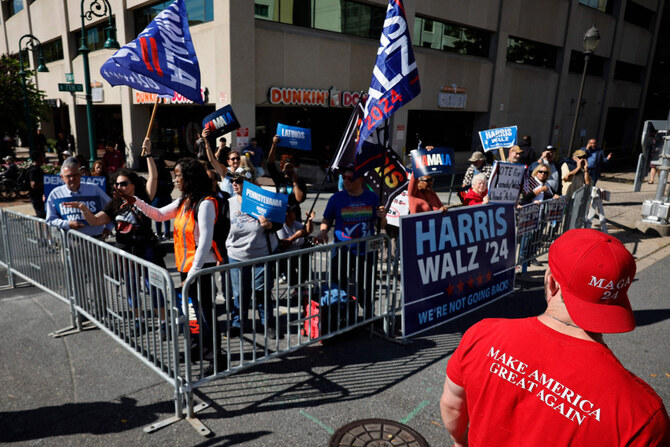DELAWARE, USA: For Erika Worobec of Cecil, Pennsylvania, mail-in voting is a family ritual. For a primary election in April, she researched the candidates and issues with her young son before making her selections.
“My son gets really excited when that envelope comes,” said Worobec, 45, who is in technical product marketing.
Two months after that election, she learned she had inadvertently marked her ballot with an incomplete date and that hers was among the 259 mail-in ballots in her county that were not recorded because of a ballot error.
“I felt it was un-American,” said Worobec, who votes by mail because she suffers from an autoimmune disease and doesn’t want to risk a trip to a crowded polling place. “How could primary results be accurate if so many ballots were not cast?“
In July, Worobec, who declined to say which presidential candidate she supported, joined a growing number of voters going to court to ensure that they have access to the polls and their ballots are counted in the Nov. 5 US presidential election.
There are roughly 95 election-related lawsuits filed in the seven battleground states that will decide the 2024 election, according to Democracy Docket, a website founded by Democratic lawyer Marc Elias that tracks election cases.
Those states are Arizona, Georgia, Michigan, North Carolina, Nevada, Pennsylvania and Wisconsin.
In general, Democrats and their allies sue to make it easier to cast a ballot, which the Republicans claim can open the door to fraudulent votes. Republicans sue to assert what they call election integrity, which critics call voter suppression.
A Reuters/Ipsos poll shows Democratic candidate Vice President Kamala Harris and former President Donald Trump, her Republican challenger, locked in a tight race with both parties fighting for every vote.
As a result, voters, advocacy groups and the two main political parties have filed lawsuits over everything from the location of polling places to voter registration procedures.
Worobec, after being approached by the state’s branch of the American Civil Liberties Union, agreed to join six other voters from Washington County, near Pittsburgh, who sued their election board. The Republican Party intervened to defend the case and in August a judge ruled that voters must be notified if a mail-in or absentee ballot has an error so voters can mount a challenge or cast a provisional ballot at their polling place.
The county election board did not respond to a request for comment.
CHALLENGES FACE MIXED SUCCESS
Other voters have had less success.
Tyler Engel, 35, a research project manager in Madison, Wisconsin, has a form of muscular dystrophy and uses a wheelchair that makes it difficult to access his polling place. To cast an absentee ballot, he would need assistance because he can’t mark a ballot with his hands.
“I have to have someone do it for me, which is kind of unnerving that people know how I vote,” he said.
Engel, who declined to say which presidential candidate he supports, said the advocacy group Disability Rights Wisconsin learned he was researching polling place accessibility and asked him to join a lawsuit that sought to allow voters like him to mark ballots electronically without assistance. The group is funding a pilot project for his research.
A lower court judge ruled that voters who are unable to see or mark a paper ballot should be emailed an electronic version, but the ruling is on hold and will not be resolved before the election.
In Michigan, the Republican National Committee and its allies sued after the governor designated Veterans Administration and Small Business Administration offices as official voter registration agencies.
Vet Voice Foundation, a nonpartisan group which advocates for US military veterans, sought to intervene.
“Oftentimes the first place a veteran is touching down is at the VA health care center, because they need to get their medications,” said Brian Stone, a 37-year-old US Navy veteran who volunteers with the group and said he supports Harris. “But more importantly, there’s a lot of veterans who unfortunately are homeless and do struggle with voter registration.”
A judge denied Vet Voice’s request and the case remains unresolved.
“These agencies should be 100 percent focused on supporting our veterans and small businesses, not spending our tax dollars to influence the election in Michigan,” said spokesperson Claire Zunk of the RNC, who called the case an overt attempt by the governor and Harris to keep the Democrats in power.
Michigan’s secretary of state did not respond to a request for comment.
A DISTANT POLLING PLACE
In Montana, a state which traditionally votes Republican and which could determine control of the US Senate, some members of the Fort Peck Assiniboine and Sioux Tribes live more than 20 miles (32 km) from the nearest election office.
Some tribal members sued election officials on Sept. 30. They asked for registration and early voting satellite offices near where they live to be open daily in the six-week run-up to the election. Settlement talks are under way.
Dylan Jensen, a Valley County attorney said the county lacked resources but as in past years would provide a satellite office for up to two days which had been used by as few as four voters. A Roosevelt County lawyer said discussions were under way.
“We have tiny towns out in the middle of nowhere, you know? Does it mean that we can’t be heard?” said Joseph Dolezilek, 38, one of the plaintiffs in the suit.


























